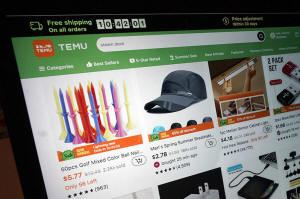|
The
European Commission, the 27-nation bloc’s executive branch, said
its investigation found “a high risk for consumers in the EU to
encounter illegal products” on Temu's site.
Investigators carried out a “mystery shopping exercise” that
found “non-compliant” products on Temu, including baby toys and
small electronics, it said.
Temu said in a brief statement that it “will continue to
cooperate fully with the Commission.”
The commission didn't specify why exactly the products were
illegal, but noted that a surge in online sales in the bloc also
came with a parallel rise in unsafe or counterfeit goods.
EU regulators said when they opened the investigation that they
would look into whether Temu was doing enough to crack down on
“rogue traders” selling “non-compliant goods” amid concerns that
they are able to swiftly reappear after being suspended.
In its preliminary findings, the Commission found that Temu
could have had “inadequate mitigation measures” because the
company was using an “inaccurate” risk assessment that relied on
general industry information, rather than specifics about its
own marketplace.
“We shop online because we trust that products sold in our
Single Market are safe and comply with our rules,” Henna
Virkkunen, the EU's executive vice-president for tech
sovereignty, security and democracy, said in a news release. "In
our preliminary view, Temu is far from assessing risks for its
users at the standards required by the Digital Services Act.
Temu has grown in popularity by offering cheap goods - from
clothing to home products — shipped from sellers in China. The
company, owned by Pinduoduo Inc., a popular e-commerce site in
China, has 92 million users in the EU.
The company will have the chance to examine the Commission's
investigation files and respond to the accusations before the EU
watchdogs make a final decision.
Violations of the DSA could result in fines of up to 6% of a
company's annual global revenue and an order to fix the
problems.
All contents © copyright 2025 Associated Press. All rights reserved

|
|


